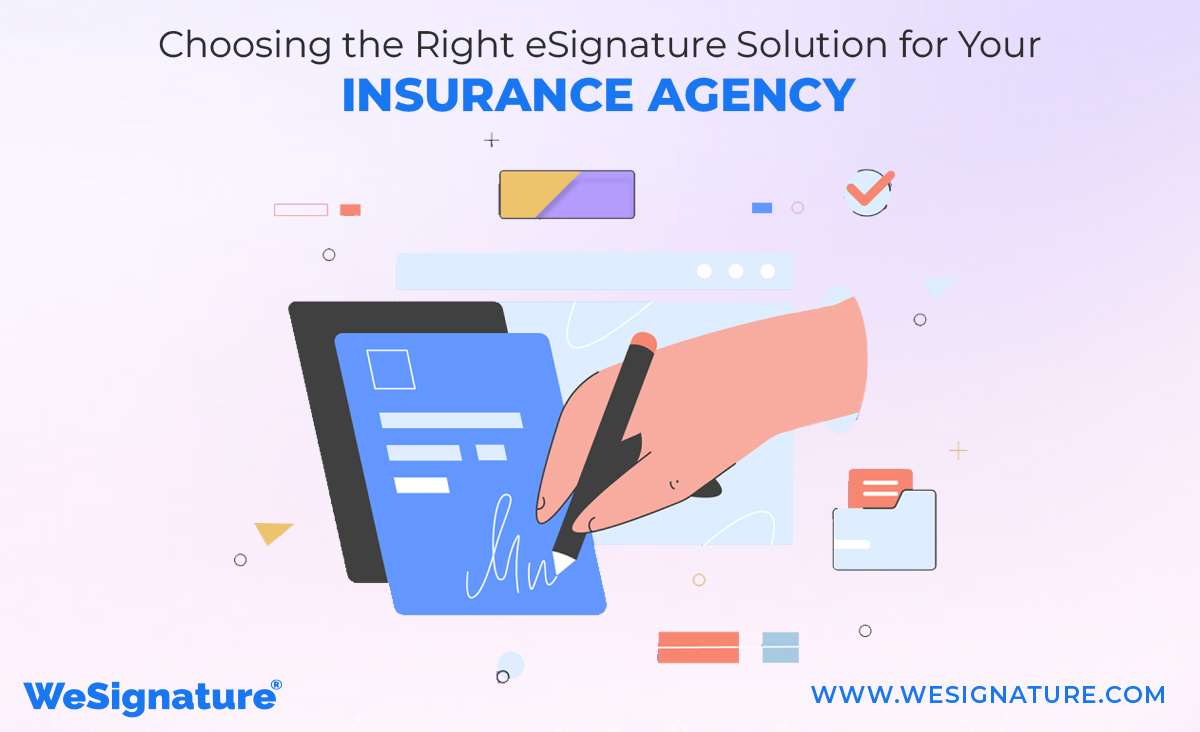In the world of new technologies and the ongoing transformation of insurance companies’ digital landscapes, insurance agencies need efficient tools that can support the optimization of their processes together with the improvement of the customer experience. One such defining tool is the eSignature solution.
The move from what is commonly regarded as the physical or handwritten signature to the electronic signature is very advantageous in so many ways.
However, with so many solutions in the market, choosing the best eSignature solution for an insurance agency is quite challenging. You will find this guide handy in your quest to find the right solution that best fits your requirements.
Understanding eSignature Solutions
What is an eSignature Solution?
An eSignature solution is one where users can sign documents in a digital context, thus, no more pen and ink signing. This technology is especially beneficial where insurers are conveying contracts and policy documents where a strict timeline is inevitable.
Additional options of eSignature solutions may start from the simple free trial or do not exceed some paid best online signature software services, up to very sophisticated paid e-signature services for large businesses.
The Importance of eSignature Solutions for Insurance Agencies
Insurance agencies work with numerous documents of customers, such as policy and claim forms, customer agreements, and compliance papers. Adopting an eSignature solution can:
- Increase Efficiency: Speed up the signing process, reducing turnaround times.
- Enhance Customer Experience: Provide a convenient and seamless way for clients to sign documents remotely.
- Reduce Costs: Cut down on paper, printing, and mailing expenses.
- Improve Security: Ensure documents are securely signed and stored, reducing the risk of fraud.
Key Features to Look for in an eSignature Solution
1. User-Friendly Interface
An interface that is easy to use is important not only for you and your personnel but for the clients as well. The eSignature solution must not be complicated but should rather be easy to understand, easy to navigate, and easy to train people on. Choose solutions that have simple, easy-to-understand guidelines and simple signing procedures.
2. Integration Capabilities
When selecting the eSignature solution, it must be integrated into your existing toolset – from CRM to document management software and email. There is seamless integration to ensure that your daily operations will not be a problem or interrupted soon.
3. Security and Compliance
Confidentiality is key when managing insurance documents that may be sensitive. Make sure that the chosen eSignature solution meets specific standards and legislative acts, for example, the eIDAS for Europe and the ESIGN Act for the United States.
Also, features such as encryption, secure storage, and audit trails are essential for document security.
4. Customization Options
The flexibility in the use of the package enables a firm to adopt a package that will suit it specifically. This can include incorporating company logos, specifying preferred email formats of communication, and the degree of formality of signs.
This requirement makes sense since the implemented solution must reflect the agency’s name and integrate with its business processes.
5. Mobile Accessibility
This is especially important in the current generation where individuals conduct most of their business through mobile devices. Make sure the solution is compatible with mobile devices so clients can sign the necessary papers using their smartphones or tablets. It increases the level of convenience and access to your clients.
6. Affordability
While there are many features present in advanced eSignature solutions, these may cost a lot of money. Evaluate the available budget for your agency and decide which strategy will be the most cost-effective.
Some agencies may require platform-free e-signature tools to be effective while others may need to purchase a better platform.
Evaluating Different eSignature Solutions
1. Free eSignature Tools
Software solutions for small to mid-size insurance agencies can benefit from free e signature tools. They are usually simple and often help in document signing and storing.
However, they may be limited in features as compared to more complex tools and may not have features such as integrations and more options for customizing the tool. Some of the most commonly used free e signature services are HelloSign as well as SignRequest.
2. eSignature Software Solutions for SMEs
If your insurance agency is an SME, it might be best to invest in a solution that provides dedicated eSigning solutions. These solutions can be called rather affordable, and at the same time, they will provide rather effective additional functions.
They might also encompass connections with well-known business applications, improved safety measures, and configurable processes. Some of the leading e-signature management systems include PandaDoc and Zoho Sign.
3. Enterprise-Grade eSignature Solutions
Some insurance agencies will require enterprise-level eSignatures, especially for large firms with intricate operations. Such platforms comprise various rich attributes such as security measures, integrations, and the ability to scale up.
Although they may cost more, their advantages in terms of reliability and usability cannot be matched. Some popular examples of this category include DocuSign and Adobe Sign.
Best Practices for Implementing an eSignature Solution
1. Conduct a Needs Assessment
It is vital to analyze your needs before choosing an eSignature solution. Determine the more delicate features concerning your agency, which include the number of documents in terms of number and complexity, integration possibilities, and budget.
Based on that assessment, you will be in a position to select the most appropriate solution for your requirements.
2. Test Multiple Solutions
Never select the earliest electronic signature solution you encounter. Experiment with several solutions to compare their features, their ease of use, and how well they can integrate with current solutions. Unfortunately, all the discussed providers present their services free of charge or contain a demo version.
3. Train Your Staff
Bringing in a new eSignature solution also should be supported by staff training efforts. Make sure they know how to use the platform now, know what it offers, and how it can help them. Training will help ensure that implementation is successful and doesn’t cause any problems and will help the solution reach its greatest effectiveness.
4. Communicate with Clients
Explain to your clients the new eSignature offering and its advantages. Assure them that specific guidance will be given on using the platform and explaining all their worries. To the client, effective communication will enable better acceptance and satisfaction.
5. Monitor and Optimize
It is advisable to follow up on the eSignature solution’s effectiveness and collect feedback from employees and customers. It is recommended that this feedback be used to fine-tune the solution and deal with any problems as soon as possible. Continuous supervision assures that the solution is relevant and optimally functional.
Understanding the Legality of Electronic Signatures
Global Standards and Regulations
The legal acceptability of electronic signatures is recognized around the world, and specific laws exist for them. Insurance agencies need to have a clear understanding of such regulations so that they can be in a position to adhere to them to avoid running foul of the law.
United States: ESIGN Act and UETA
The United States has the ESIGN Act (Electronic Signatures in Global and National Commerce Act) and the UETA (Uniform Electronic Transactions Act). These laws affirm that the signature is equally valid to the handwritten one if it fulfills specific requirements such as the intent to sign the document and affirmation that the signature is linked to the document.
European Union: eIDAS Regulation
EIDs (Electronic Identification, Authentication, and Trust Services) Regulation also regulates the electronic signatures in the member states of the European Union. It allows the recognition and acceptance of electronic signatures both in general and in the context of trans-border transactions within the EU area.
There are categories of electronic signatures specified by eIDAS; they are simple electronic signatures, advanced electronic signatures, and qualified electronic signatures that have different levels of security and legally binding force.
Key Legal Considerations for Insurance Agencies
1. Intent and Consent
To present legal evidence that the signatory accepted the terms of the contract electronically, the e-signature must prove the signatory’s intent to so sign the document. Make certain that your eSignature solution makes this possible, commonly with a ‘Click to sign’ functionality or the like.
2. Association with the Document
An electronic signature needs to be easily and unambiguously linked to the document that the signature addresses. This can be done through smart seal technologies that incorporate the signature with the document in such a way that it will be difficult to alter the document without showing evidence of having been tampered with.
3. Record-Keeping and Audit Trails
Ensure that there are records that show signed contracts together with the signatures made on such contracts. Information audit trails that capture activities that occur in the signing process are important, especially in legal matters and disputes.
Select an eSignature service provider that provides a detailed and comprehensive audit trail solution.
Future Trends in eSignature Solutions for Insurance Agencies
1. Blockchain Technology
E-signature solutions can gain greater popularity with the use of blockchain technology in the future. This is so because of its decentralized inherent nature that provides for enhanced security, and open and alternative signed documents.
Insurance agencies who follow eSignature based on blockchain shall be able to reject the chance of fraud and have more trust in the amity of the digital signatures.
2. Artificial Intelligence and Machine Learning
AI and ML are expected to transform eSignature solutions shortly. These technologies can help automate document processing, recognize signs of fraud, and gain insights into signing patterns. eSignature solutions powered by AI will make it possible for insurance agencies to improve efficiency and make better decisions.
3. Biometric Signatures
Fingerprint or face recognition as a type of biometric signature ensures greater protection and credibility. In the future, with the development in the technological field, insurance agencies might incorporate biometric eSignature systems to guarantee that only the intended persons are signing the documents.
4. Enhanced Integration with IoT
The Internet of Things or IoT has impacted a myriad of businesses, and eSignature solutions also fall into this category. The integration with IoT devices is favorable to facilitate smart and secure digitized signing processes, especially if not one but several verifications are needed.
For instance, for insurance firms, IoT-connected eSignature can be used to validate the identity of policyholders, and other information as well as accelerating the process of settlement of claims.
Conclusion
Selecting the best eSignature solution for your insurance agency is a huge decision that can have vast implications for the way your business runs, how clients engage with you as an insurance provider, and how profitable your insurance agency is in the long run.
First, when the main options and basic functionality have been explored, you can choose the solution that best fits your agency after weighing considerations of cost, and legal compliance.
Regardless of the software; free ‘e-signature tool’ for individual, ‘SME-level’, or ‘enterprise-level’ solutions, the adoption of electronic signing will improve your productivity, protection, and customer satisfaction.
At WeSignature, we always appreciate the different needs of the insurance agencies and therefore our eSignature solution is specially tailored for your needs. By being easily accessible, secure, and flexible to integrate with various systems, we are the best partners insurance agencies could find for eSignature solutions.
Find out how WeSignature can revolutionise your document signing and level up your agency’s effectiveness and customer satisfaction.




